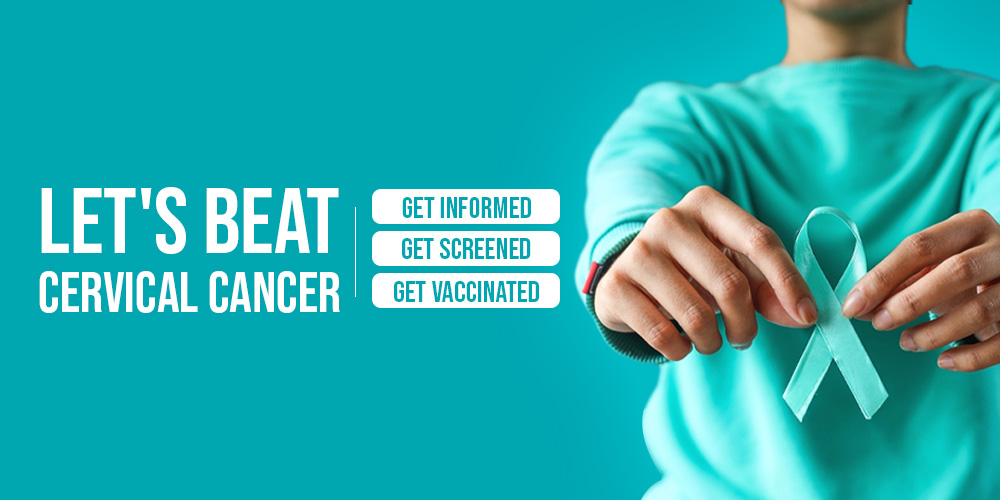Last Updated on January 25, 2024

As the calendar moves into January, the global spotlight is once again on women’s health with the observation of Cervical Cancer Awareness Month 2024. It serves as a vital opportunity to educate and inform the public about cervical cancer, its risk factors, preventive strategies, and the importance of regular screenings. Cervical cancer is a significant worldwide health issue affecting women of all ages and backgrounds.
This article will delve into the various aspects of cervical cancer, shedding light on the importance of awareness through Cervical Cancer Awareness Month, early detection, and preventive measures.
Understanding Cervical Cancer
Cervical cancer is the leading cause of cancer-related deaths among women globally. According to the World Health Organization (WHO), 604,000 new cases and 342,000 deaths occurred globally in 2020, due to cervical cancer. Cervical cancer is a significant issue in developing countries, but it is also prevalent in developed countries, making it a widespread concern that requires immediate attention.
It is a type of cancer that develops in the cervix or lower part of the uterus. Most cervical cancers are caused by chronic infection with high-risk forms of human papillomavirus (HPV), a sexually transmitted infection. Understanding the link between HPV and cervical cancer is vital for prevention and early management.
Understanding Risk Factors
HPV Infection:
Cervical cancer is mostly caused by persistent infection with high-risk HPV. HPV is a group of viruses transmitted through sexual contact. Certain strains, notably HPV-16 and HPV-18, are closely linked to the development of cervical cancer.
Lack of Vaccination:
Vaccination against HPV is an effective preventative strategy. The introduction of vaccinations has created a chance to protect people from the most prevalent high-risk HPV strains. However, global immunization rates remain low, impeding efforts to reduce cervical cancer incidence.
Smoking:
Cigarette smoking is a known risk factor for cervical cancer. Tobacco contains substances that can weaken the immune system and make the cervix more susceptible to HPV infection. Campaigns for Cervical Cancer Awareness Month 2024 should highlight the role of tobacco cessation in reducing cervical cancer risk.
Weakened Immune System:
Individuals with compromised immune systems, such as those living with HIV/AIDS or undergoing immunosuppressive therapy, are at a higher risk of developing cervical cancer.
Also read: Is Cervical Cancer Genetic?
”“Cervical Cancer Awareness Month 2024 focuses on educating women about their bodies and reproductive health. The month aims to foster a sense of empowerment by equipping women with information that will encourage them to prioritize their health, get tests, and engage in cervical health conversations.”
The Importance of Cervical Cancer Awareness Month 2024
Promoting Early Detection:
Cervical Cancer Awareness Month 2024 is not just an annual observance; it is a call to action. The major purpose of celebrating this day is to underline the important role of early detection in the battle against cervical cancer. Regular screenings, such as Pap smears and HPV tests, play an essential role in detecting abnormalities before they develop into later stages. By integrating these screenings into regular healthcare regimens, women can take charge of their reproductive health and help with early intervention.
Raising Awareness:
One of the primary objectives of Cervical Cancer Awareness Month 2024 is to spread awareness about the condition. The goal of targeted education programs, community outreach activities, and media involvement is to raise public awareness on the risk factors linked with cervical cancer, the value of screenings, and the role of vaccination in preventing high-risk HPV infections. Cervical cancer clinical trials may also help people manage the condition effectively.
Early Detection: A Lifesaving Measure
Pap Smear Test:
Cervical Cancer Awareness Month 2024 highlights the significance of regular screenings, especially the Pap smear test. This simple yet successful treatment procedure extracts cells from the cervix and examines them for pre-cancerous or malignant alterations. Regular Pap screenings allow women to make proactive efforts to manage their reproductive health.
HPV Testing:
HPV testing, along with Pap tests, is now an essential part of cervical cancer screening. Identifying the presence of high-risk HPV enables medical professionals to intervene early, preventing cervical abnormalities from progressing to cancer. Cervical Cancer Awareness Month 2024 encourages people to engage in discussions with their healthcare providers about HPV testing in their screening schedules.
Early Detection Saves Lives:
The message of Cervical Cancer Awareness Month 2024 is clear: early detection saves lives. Women who prioritize regular screenings and stay informed about their reproductive health have a far better chance of finding cervical abnormalities in their early, more treatable stages.
Overcoming Barriers to Prevention
Addressing Stigma:
Cervical Cancer Awareness Month 2024 recognizes the amount of stigma while discussing sexual health and reproductive problems. Breaking down these societal barriers is vital for fostering open interactions and making people feel comfortable seeking information and treatment.
Increased Access to Healthcare:
The month acts as a catalyst for addressing the hurdles to healthcare access that still exist in many regions of the world. Cervical Cancer Awareness Month 2024 encourages the implementation of policies and initiatives that improve access to screenings, vaccinations, and treatment so that no woman falls behind in the battle against cervical cancer.
Empowering Women:
Cervical Cancer Awareness Month 2024 focuses on educating women about their bodies and reproductive health. The month aims to foster a sense of empowerment by equipping women with information that will encourage them to prioritize their health, get tests, and engage in cervical health conversations.
Summary
Cervical Cancer Awareness Month 2024 is a call to action, urging individuals, communities, and countries to unite in the battle against cervical cancer. By prioritizing prevention, early detection, and ongoing education, we can work towards a future where cervical cancer is not just treatable but also preventable, ensuring the well-being of women worldwide. Many clinical research organizations are working to find the best possible treatment options for HPV infections and cervical cancer that may help women lead healthier and happier lives.




